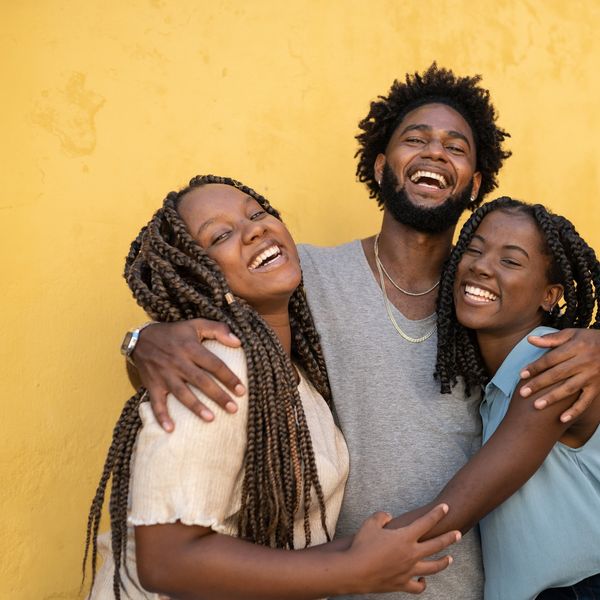
What's The 'Five Friendship Theory' All About?
A few years ago, I penned a piece for the platform that had some readers super hot. It was entitled, “Why I Prefer My Friends To NOT Be Friends With Each Other.” For some reason, they thought that my resolve was about insecurity. What’s hilarious is some of those very people ended up writing me, some months later, to say that they actually got where I was coming from after going through a few things in their own world.
Listen, when it comes to my friends who were already friends with each other, it’s whatever. Beyond that, though, it has served me well to keep that kind of “You’ve got your friends, and I’ve got mine” type of boundary — not just when it comes to my relationships but my friends and their friends whom I am not friends with as well. For one thing, I can decide what I want known and what I don’t want known; when all of your friends are friends, all kinds of assumptions about who can and should know what can be made that could be dead wrong.
Another reason? Friendships come in levels — in other words, no one should assume that just because I am friends with multiple people that the closeness or intimacy is the same with others as it is with them. So, if everyone is cool with each other and not exactly close, I don’t have to worry about that. And these reasons are just the tip of my iceberg.
Besides, it’s not like this “rule” of mine affects a ton of people. I say that because I don’t call a ton of people my “friend” in the first place. One reason is because I think that “friend” is a very serious title to have, one that comes with a lot of mutual responsibility and reciprocity. Secondly, I know that there is A LOT of space in between “friend” and “enemy.” That’s why, when I first happened upon the whole “five friendship theory” notion, it made complete and total sense to me.
Why Humans Can Only Maintain Five Close Friends
If you’re not familiar with what that is, let’s discuss it today to see if you agree that it’s truly onto something — that you are rich beyond measure if you’ve got five solid friends. Not only that, but it’s probably, in most instances, a wise number to both start and stop at.
First of All, What’s Your Personal Definition of “Friend”?
 Giphy
GiphyIn order for you to really appreciate the theory and where the notion is actually coming from, first ponder how you would define the word “friend” to begin with. If you’d like a few articles to jumpstart your brain, check out “10 Things You Should Absolutely Expect From Your Friendships,” “10 Signs You’ve Got A Close (TOXIC) Friend,” and “Allow These Things To Happen Before Calling Someone 'Friend.'”
Me personally? My friends are closer to me than a ton of my blood relatives are. There are sweet sentiments behind that and also, sometimes, top-tier inconveniences as well (check out “Life Taught Me That True Friendships Are 'Inconvenient'”). Wait — did I mean to say “inconvenient”? Indeed, I did. Sometimes I’ve paid bills for a friend. Sometimes I’ve been awakened in the middle of the night by a friend. Sometimes, quite frankly, I’ve done things that I don’t even remotely want to do yet because my friend asked, it was as good as done. Why? Because my friends have done/will do those same things for me. And that’s a huge part of the reason why I don’t use the word casually.
That’s how I see my friendships, though. When it comes to your own, what do you require? What do your friends require of you? And when you factor in all that comes with both of those questions, how much time, effort, energy, and resources do you have to devote to multiple people?
This brings me to my next point.
Now, Let’s Explore Why You Can Probably Only Maintain Five Friendships
 Giphy
GiphyEarlier this year, The Guardian published an article entitled, “Five intimate friendships is the optimal amount – I scrape two.” Long story short, she was talking about how she finds it easier to maintain relationships that are close by rather than long-distance ones. While I get her overall point, most of my friends have lives that are just as, if not more, full as my own whether we live in the same city or not. In fact, one of my closest friends is in another state, and we talk more than some of the people who are 10 miles away from me; so, in many ways, I think the author’s point has to do with her personal friendship love language (check out “This Is How To Apply Love Languages To Your Friendships”) and her personal approach to relationships.
However, what her narrative did confirm is that, especially as adults, our plates are full. Therefore, to be able to nurture a true friendship in the way that it truly deserves, you’re probably only going to be able to consistently manage about five of them (especially if you’re married and/or have children). And honestly, there is nothing wrong with that. It really is time for (some of) us to stop thinking that life is one big high school.
What I mean by that is, when we were teenagers, a big part of how many of us defined friendship was by how popular or liked we were. Now, our friendships need to be about who supports us, who nurtures us, and who helps to make us better people. Friendship needs to be seen from the angle and perspective of a quote that I once read by actor Amy Poehler: “Find a group of people who challenge and inspire you; spend a lot of time with them, and it will change your life."
Spend a lot of time with them. Chile, when you’re thriving in your purpose (regardless of your relational status), who has a lot of time for much of anything outside of that? This part actually reminds me of some things that I’ve heard stated by a Black influencer who goes by Only One Jess say about learning how to navigate some of her (what she calls) high-maintenance friends vs. low-maintenance ones. I believe she’s 31, and I’m not (LOL)…time evolves a lot of insights of friendship navigation; however, she’s got a solid point when it comes to different kinds of friends need different things, especially when you know that you are living “in your lane”— which is another reason why “five” is a pretty solid number. Not to mention the fact that, biblically, “5” actually means grace (and yes, friendships need quite a bit of that as well).
So yeah — if you’re committed and consistent, five (especially close) friendships may be just about all that you can manage. Does this mean that you can’t have other people in your world? Of course, not. Remember how I said that there is a lot of space between friend and enemy? Let me expound on that for just a sec.
Have You Ever Wondered What Your Own “People Bandwidth” Is?
 Giphy
GiphySomeone who is in my personal top five talks about bandwidth quite a bit. One definition of that word is literally “a range of frequencies” while another is “the energy or mental capacity required to deal with a situation.” It’s another article for another time to be careful about making sure that your life isn’t filled with a lot of people who pretty much do nothing more than drain your energy; however, when it comes to what we’re tackling today — what do you have the energy and mental capacity for, overall, when it comes to your relationships with other people?
According to a British anthropologist by the name of Robin Dunbar, no human can properly maintain more than 150 relationships; not close friendships, mind you — no, he’s speaking of relevant connections, in general. Based on his findings, any number above that is not going to have much longevity. OK, so how does he break all of this down? Good question.
Per an article I read that explains the theory well:
“According to the theory, the tightest circle has just five people – loved ones. That’s followed by successive layers of 15 (good friends), 50 (friends), 150 (meaningful contacts), 500 (acquaintances) and 1500 (people you can recognise). People migrate in and out of these layers, but the idea is that space has to be carved out for any new entrants.”
From what I’ve read and researched on the topic, our brain literally doesn’t have the ability to properly and responsibly handle more than this. So, with his theory being in front of you, do you agree? Do you really only have the “bandwidth” for five close friends and then the “bandwidth” for no more than 150, as he puts it, meaningful contacts? Now, before you answer, let me bring more one point into the dynamic.
Remember, There Are Always “Levels” to This Thing
 Giphy
GiphyLive on this earth long enough (which, let’s be real, that includes being disappointed by enough people), and you’ll learn that friendships ARE NOT a monolith. Indeed, there are plenty of layers to them. That’s why I wrote articles like “Always Remember That Friendships Have 'Levels' To Them” and “According To Aristotle, We Need ‘Utility’, ‘Pleasure’ & ‘Good’ Friends.”
When it comes to the Aristotle piece, his theory is that we need work/career/purpose (which aren’t exactly the same things), friends, friends who we can kick it with (you may have common interests), and then friends who build your character. Based on what your priorities are at any given time, you may have more “bandwidth” for one of those types of friends more than the others.
The point here is that, as you start to sort out what it means, TO YOU, to call someone “friend” and then you begin to branch out, please don’t feel like everyone has to check off all of the same boxes — they absolutely do not.
I’ve got some friends who I will drop everything right now and tend to. Then, I have meaningful connections. Yeah, I really like that “space” between friend and enemy because some people really can mean a lot to you, but you wouldn’t exactly consider them to be a “friend.” Right now, I’ve got someone in my life who is going through a super challenging situation. We’re not friends, yet I do care profoundly about them, so I’ve been intentional about making time for them, weekly, until their particular storm passes.
Yeah, one of the things about applying Dunbar and Aristotle’s theories to your life is you can start to categorize who fits where and when — without getting confused or even feeling bad about it. Your “levels” can make you handle your bandwidth with extreme care before it — or you — up and snaps because you simply have nothing left to give.
Final point.
Never Be Apologetic for Having a “Friend Limit”
 Giphy
GiphyA part of the reason why I thought it was important to write this article is because I think that most of us have had one time or another when we’ve felt bad for not having it in us to give as much as people expect. It’s also another message for another time, how important it is to make sure that if you’re “stretching yourself thin,” it’s for people who would do the same for you. For many years, I was stretching out, and it was completely one-sided…and that is why I was so tapped out. Yet — and please hear me when I say this — even when it comes to reciprocators, it’s still okay to have friend limits.
Some people laugh at the Gemini in me and/or the Shellie in me, who will be quick to tell someone who expects certain things of me (simply because they decided that they should have it), “We aren’t friends; I do that for my friends.” And again, only people who think there are two relational teams only (friends and enemies) would be offended by that. Not everyone is your spouse; it’s an esteemed title.
The more you value friendship, not everyone should be called “friend” either.
So yeah, whether you agree with Dunbar and your limit is five or you’ve got 20 — your limit is your limit. Be okay with being okay with that…it doesn’t matter who else isn’t. You know your bandwidth, your energy level, your mental capacity; that’s all that matters.
Aight. Let me hop off of this thing in order to tend to one of my “top five”.
I’m telling you, this theory can be so freeing. At least…consider applying it.
When it comes to the quality of your relationships, it could be a real game-changer.
Straight up.
Let’s make things inbox official! Sign up for the xoNecole newsletter for daily love, wellness, career, and exclusive content delivered straight to your inbox.
Featured image by Delmaine Donson/Getty Images
Different puzzle pieces are creating bigger pictures these days. 2024 will mark a milestone on a few different levels, including the release of my third book next June (yay!).
I am also a Professional Certified Coach. My main mission for attaining that particular goal is to use my formal credentials to help people navigate through the sometimes tumultuous waters, both on and offline, when it comes to information about marriage, sex and relationships that is oftentimes misinformation (because "coach" is a word that gets thrown around a lot, oftentimes quite poorly).
I am also still super devoted to helping to bring life into this world as a doula, marriage life coaching will always be my first love (next to writing, of course), a platform that advocates for good Black men is currently in the works and my keystrokes continue to be devoted to HEALTHY over HAPPY in the areas of holistic intimacy, spiritual evolution, purpose manifestation and self-love...because maturity teaches that it's impossible to be happy all of the time when it comes to reaching goals yet healthy is a choice that can be made on a daily basis (amen?).
If you have any PERSONAL QUESTIONS (please do not contact me with any story pitches; that is an *editorial* need), feel free to reach out at missnosipho@gmail.com. A sistah will certainly do what she can. ;)
ItGirl 100 Honors Black Women Who Create Culture & Put On For Their Cities
As they say, create the change you want to see in this world, besties. That’s why xoNecole linked up with Hyundai for the inaugural ItGirl 100 List, a celebration of 100 Genzennial women who aren’t afraid to pull up their own seats to the table. Across regions and industries, these women embody the essence of discovering self-value through purpose, honey! They're fierce, they’re ultra-creative, and we know they make their cities proud.
VIEW THE FULL ITGIRL 100 LIST HERE.
Don’t forget to also check out the ItGirl Directory, featuring 50 Black-woman-owned marketing and branding agencies, photographers and videographers, publicists, and more.
THE ITGIRL MEMO

I. An ItGirl puts on for her city and masters her self-worth through purpose.
II. An ItGirl celebrates all the things that make her unique.
III. An ItGirl empowers others to become the best versions of themselves.
IV. An ItGirl leads by example, inspiring others through her actions and integrity.
V. An ItGirl paves the way for authenticity and diversity in all aspects of life.
VI. An ItGirl uses the power of her voice to advocate for positive change in the world.
Let’s make things inbox official! Sign up for the xoNecole newsletter for daily love, wellness, career, and exclusive content delivered straight to your inbox.
You've Never Seen Luke James In A Role Quite Like This
Over the years, we've watched Luke James play countless characters we'd deem sex symbols, movie stars, and even his complicated character in Lena Waithe's The Chi. For the first time in his career, the New Orleans-born actor has taken on a role where his signature good looks take a backseat as he transforms into Edmund in Them: The Scare—a mentally deranged character in the second installment of the horror anthology series that you won't be able to take your eyes off.
Trust us, Edmund will literally make you do a double take.
xoNecole sat down with Luke James to talk about his latest series and all the complexity surrounding it—from the challenges taking on this out-of-the-box role to the show's depiction of the perplexing history of the relationship between Black Americans and police. When describing the opportunity to bring Edmund's character to life, Luke was overjoyed to show the audience yet another level of his masterful acting talents.
"It was like bathing in the sun," he said. "I was like, thank you! Another opportunity for me to be great—for me to expand my territory. I'm just elated to be a part of it and to see myself in a different light, something I didn't think I could do." He continued, "There are parts of you that says, 'Go for it because this is what you do.' But then also that's why it's a challenge because you're like, 'um, I don't know if I'm as free as I need to be to be able to do this.' Little Marvin just created such a safe space for me to be able to do this, and I'm grateful for everything I've been able to do to lead to this."

Them: The Scare, like the first season, shines a light on the plight of Black Americans in the United States. This time, the story is taking place in the 1990s, at the height of the Rodney King riots in Los Angeles. While the series presents many underlying themes, one that stands out is Black people and the complicated relationship with the police. "For the audience, I think it sets the tone for the era that we're in and the amount of chaos that's in the air in Los Angeles and around the country from this heinous incident. And I say it just sets the tone of the anxiety and anxiousness that everybody is feeling in their own households."
James has been a longtime advocate against police brutality himself. He has even featured Elijah McClain, the 23-year-old Colorado man who died after being forcibly detained by officers, as his Instagram avatar for the past five years. So, as you can imagine, this script was close to his heart. "Elijah was a soft-loving oddball. Different than anyone but loving and a musical genius. He was just open and wanted to be loved and seen."

Luke continued, "His life was taken from him. I resonate with his spirit and his words...through all the struggle and the pain he still found it in him to say, 'I love you and I forgive you.' And that's who we are as people—to our own detriment sometimes. He's someone I don't want people to forget. I have yet to remove his face from my world because I have yet to let go of his voice, let go of that being [because] there's so many people we have lost in our history that so often get forgotten."
He concluded, "I think that's the importance of such artwork that moves us to think and talk about it. Yes, it's entertaining. We get to come together and be spooked together. But then we come together and we think, 'Damn, Edmund needed someone to talk to. Edmund needed help... a lot [of] things could have been different. Edmund could have been saved.'
Check out the full interview below.
Luke James Talks Ditching Sex Symbol Status For "Them: The Scare", Elijah McClain, & Morewww.youtube.com
Featured image by Getty Images









